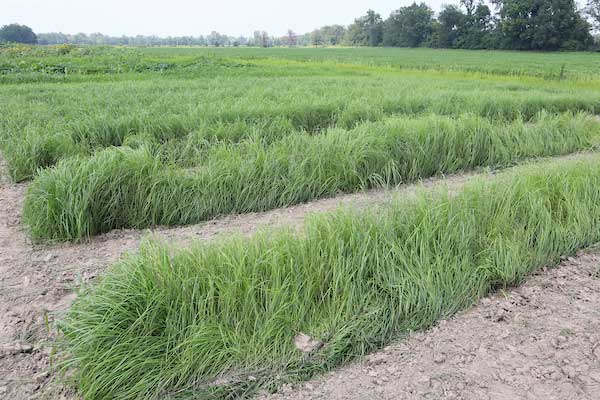From the Ground Up at the Danforth Center Field Research Site
When Eli Isele, Farm Manager & Field Research Operations Coordinator, first visited the new Field Research Site, about a 30-minute drive from the Danforth Center in O’Fallon, MO, he knew he had his work cut out for him. With the exception of a cover crop experiment, the site was bare land.
Danforth Center scientists had diverse needs for productive research plots. After organizing the plots using Google Earth, he started building out the infrastructure needed to make the field research site a functional operation. Working with Center scientists like Dr. Allison Miller, new irrigation pumps were installed, a pickup truck and tillage tractor were acquired, and necessary facilities like a new bathroom were initiated.
Eli is working with Center teams to manage over 16 research plots planted with teff, cassava, sunflowers, grapes, maize, sorghum and other plants. “We’re learning a lot about the fields this year that will make the growing season even better next year,” says Eli. One of the biggest challenges at the site has been drainage issues. “We’ve had quite a bit of rain in spring and early summer, so we are dealing with water infiltration issues with the soil,” he says.

Teff plot at the Donald Danforth Plant Science Center Field Research Site
Eli very much enjoys collaborating with all of the research teams working at the field site and the wide variety of plants. He is particularly fond of Dr. Becky Bart’s cassava. “I lived with people who ate cassava when I was in the Peace Corps. Working on cassava is so outside of the norm, so it has been really interesting to see her push the limits of growing cassava in the Midwest.”
Eli is excited about the potential impact of Dr. Chris Topp’s experimental plots that are exploring how corn stores carbon in the soil. “It is crucial that we move forward with carbon markets and create an incentive for farmers to help mitigate the climate crisis,” he says. He is also excited about Dr. Allison Miller’s team collaboration with the Land Institute, which includes identifying and domesticating perennial sunflowers. “I was not expecting to work with alternative agriculture crops in St. Louis,” says Eli.
Eli’s role at the Danforth Center aligns with his personal passion for working with smallholder farmers. After living with farmers in Malawi and working on farms in Hawaii, he experienced firsthand how a lack of access to agricultural technology can impact families and their communities. “I feel really good knowing that I am helping research move forward and creating an environment that will help produce good results,” says Eli.